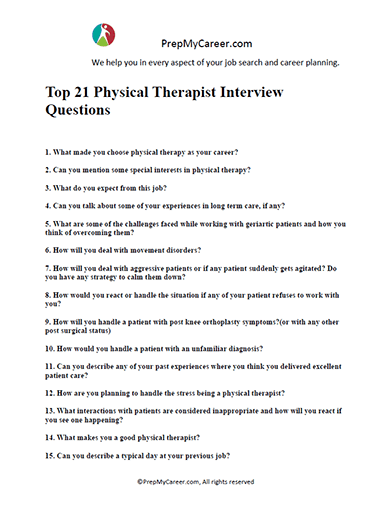With being a physical therapist comes great responsibilities of healing and caring for patients. Physical therapist plays an important role not only in rehabilitation and recovery of a patient but also has a responsibility to keep the flame of hope burning without giving any false hopes.
The interview questions for the physical therapists are mainly situational and operational. They are mainly focused on your CDM (clinical decision making) skills, how you will interact with patients and their families and your passion towards this job and of course your knowledge about different areas of the field.

Physical Therapist Interview Questions and Answers
1. What made you choose physical therapy as your career?
Ans: The answer you give should reflect your purpose or moto clearly. You can mention some childhood incidents or any other moments from past that inspired you to choose physical therapy as your career. You can start by letting them know about how you always wanted to be in a health care field.
2. Can you mention some special interests in physical therapy?
Ans: I think the physical therapy comes handy in increasing the patients’ quality of life in numerous ways but what interests me most is the way it gives a hope for recovery and normalcy even after ones body goes through a tragedy.
3. What do you expect from this job?
Ans: This question is actually to judge your POV towards the job. Let them know how delighted you are to serve as a physical therapist and that your expectations from this job are just to increase your opportunities to help as many patients as you can.
4. Can you talk about some of your experiences in long term care, if any?
Ans : Speak about some of your long term care experiences(if any). Refrain from sharing much data about the patient to honour the confidentiality. Let the answer for this question reflect your caring nature towards your patients. You can mention some incidents that will show your decision making skills during period of that long term care.
5. What are some of the challenges faced while working with geriartic patients and how you think of overcoming them?
Ans : This question is to know that you have patience in you. You can share your experiences about any of your old age patients(if any).
6. How will you deal with movement disorders?
Ans: This question is to judge your knowledge and decision making skills. Let them know you have proper knowledge of the subject.
E.g: firstly I will start by knowing the cause of the movement disorder. Accordingly I will include physical therapy sessions that can include some stretching and mobilizing tasks to restore the strength and balance.
7. How will you deal with aggressive patients or if any patient suddenly gets agitated? Do you have any strategy to calm them down?
Ans : This question is to judge your professionalism. So be as professional as you can while answering.
E.g. I will try to understand the reason of aggeression and agitation and act acoordingly. I will try to convience patient that I have his/her best interest in my mind.
8. How would you react or handle the situation if any of your patient refuses to work with you?
Ans : This question is to judge your professionalism. Let them know you would never act unprofessional under any severe circumstances.
E.g. I would try to know the reason behind the refusal because if its my behaviour or anything related to me I can try to make changes in myself so that I can give best possible treatment for other patients. I will also assure the patient my best services.
9. How will you handle a patient with post knee orthoplasty symptoms?(or with any other post surgical status)
Ans : First mention the possible symptoms that can be observed in given post surgical status and act accordingly.
e.g: After knee orthoplasty some patients experience stiffness. I can ask for different physical session to improve mobility or recommend for other diagnostic test depending upon the severity of the case.
10. How would you handle a patient with an unfamiliar diagnosis?
Ans : I won’t declare any results or move forward without getting familiar with the diagnostic completely. I will ask some other diagnostic tests if required or I could ask for a second opinion to serve my best services for my patient.
11. Can you describe any of your past experiences where you think you delivered excellent patient care?
Ans : This question is to know your experiences and quality of your work. So feel free to share your experiences(is any) and again refrain from sharing any personal details about the patient. This will reflect your professionalism.
12. How are you planning to handle the stress being a physical therapist?
Ans : You can share your personal ways of stress management and also accept the fact that stress is the part of the job.
e.g. Stress management has been the part and parcel of my life since the very beginning and as this job include social exposure we can’t afford to neglect the effects of our stress on our patients. So I can implement many proven ways like meditation and yoga to calm my body. I will also not forget that stress is the part of this job, we can never avoid it completely.
13. What interactions with patients are considered inappropriate and how will you react if you see one happening?
Ans : Let them know that being a physical therapist you will respect boundaries and never ask any personal or offending questions to a patient. You will also respect the difference in opinion of any patient and never act unprofessionally. Also assure that you will never entertain any unethical act in your watch.
14. What makes you a good physical therapist?
Ans : While answering this question focus on your different skills and abilities that will help you be a good physical therapist e.g. decision making skills, good social skills,etc. Try not to sound conceited while answering this question.
15. Can you describe a typical day at your previous job?
Ans : Mention the work atmosphere at your previous job. Talk about the number of patients you attended during the period. Talk about the skills you adapted through your routine.
16. How will you comfort a patient who is scared of a treatment plan or a surgery?
Ans : I will let him know about the benefits of the plan and that I will always have the best interest of him/her in mind.
17. How will you encourage a patient to be optimistic without giving any false hopes?
Ans : I will tell him how positive vibes and thought process affect ones health. Give him the reason to be optimistic. Advice him to spend more time with his family or his loved ones to be surrounded by positive vibes.
18. How will you handle working with a difficult co-worker?
Ans : To keep a work place toxic free the most important quality the employees or workers should possess is tolerance. Tolerance is the base of keeping the working environment stable. This doesn’t mean that you will tolerate anything unethical. Let them know that you will confront the co worker personally and be professional
19. How are you looking forward to show sensitivity towards potential cultural differences?
Ans : While answering this question let them know that you respect all the cultures and you will try your best to not to be insensitive towards anyone’s culture.
20. What are the latest trends in physical therapy?
Ans : This question is to know that you are up to date regarding progress in the field of physical therapy. You can talk about increasing involvement of technology in physiotherapy or other things that are trending.
21. How will you handle a situation where you find out that your colleague is not upholding treatment standards?
Ans : I would try to be as professional as possible and confront him about his acts. Suggest him to stop it or improve his/her ways and if he is involved in any kind of unethical act I will be obliged to report it.
Download the list of questions in .PDF format, to practice with them later, or to use them on your interview template (real questions asked in Physical Therapist Interview):
Conclusion
The job of physical therapist is linked with expectations from many. So when you go for an interview you are not only examined for you knowledge and skills but also your social abilities of interaction and your personality. The interviewer will also ask you about your hobbies and your other interest to get to know you better. Your passion towards your job has always driven you well but an unprepared interview can cost you an opportunity to serve your purpose and help many patients. So be prepared and have your mind cleared. Present the best possible version of yourself. Make them believe that you will actually be an asset for the organisation or the company.
References
- https://academic.oup.com/ptj/article/91/1/87/2735103?login=true
- https://link.springer.com/article/10.1007/s00167-018-4979-2
- https://health.economictimes.indiatimes.com/health-files/emerging-trends-in-physiotherapy/883
Sandeep Bhandari is the founder of PrepMyCareer.com website.
I am a full-time professional blogger, a digital marketer, and a trainer. I love anything related to the Web, and I try to learn new technologies every day.
All the team management, content creation, and monetization tasks are handled by me. Together with the team at PrepMyCareer, the aim is to provide useful and engaging content to our readers.
